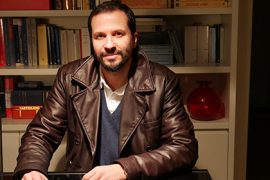E’ tempo ormai di interessarsi a dovere dei Blaak Heat Shujaa.
Trio di origine parigina, stabilitosi a Los Angeles e passato un po’ in sordina nel nostro bel paese, i Blaak rappresentano ad oggi una delle più felici rivelazioni dello stoner rock psichedelico contemporaneo. A testimoniarlo non è solo il loro ultimo lavoro “The Edge Of An Era“, uscito la primavera scorsa e prodotto dall’americana Tee Pee Records, ma anche il precedente Lp “The Stoner Generation” apparso qualche mese prima e registrati entrambe nel rench di -niente di meno che- l’ex-Kyuss: Scoot Reeder.
Con “The Edge of An Era“, i Blaak offrono un album a sei titoli coerente, accattivante e acusticamente interessante anche quando le digressioni si fanno inevitabilmente più lunghe e torbide. La voce di Mario Lalli inoltre, altra icona desert rock d’oltre oceano con i suoi gruppi ‘Yawning Man’ e ‘Fatso Jetson’, s’inserisce a perfezione sul pezzo “Pelham Blue“, impreziosendo l’album con ancora una marcia in più.
Nell’attesa di vederli passare live anche in Italia, Thomas Bellier, leader, voce e chitarra del gruppo, ha gentilmente risposto ad alcune domande, nella speranza di colmare i vuoti lasciati da una limitata ed ingiustificata disattenzione tutta italiana.
Da dove viene fuori l’origine del nome del vostro gruppo “Blaak Heat Shujaa” e cosa significa esattamente?
Un “shuiaa” è un guerriero asceta presente in alcune culture di lingua swahili. Questa è l’unica spiegazione che si può dare sul nome del nostro gruppo. Ah, si, giustamente abbiamo dovuto aggiungere la parola “black“, per un buon equilibrio. Ma da quanto mi è sembrato di capire, l’abbiamo scritta in modo sbagliato (tono ironico).
Voi avete cominciato a suonare in Francia, poi vi siete spostati in America. Come avete deciso di andare negli States e come avete avuto questa opportunità?
Andare in America non è stato direttamente legato alla musica. Quando il gruppo ha cominciato a suonare a Parigi, in Francia, io avevo già vissuto per metà dell’anno negli USA, per motivi familiari e di lavoro. Quando finalmente mi sono trasferito definitivamente negli States nel 2011, Antoine Morel-Vulliez (bassista del gruppo, ndr) ed io abbiamo deciso di prendere con noi un nuovo batterista Mike Amster, che è di Los Angeles.
Negli Stati Uniti avete incontrato e lavorato insieme a delle importanti leggende della desert music come Scott Reeder (che ha inoltre prodotto il vostro ultimo album) e Mario Lalli. Com’é stato lavorare con loro? Ha questo tipo di collaborazione messo un limite alla vostra spontaneità? Voglio dire hanno questi “grandi saggi” influenzato la vostra creatività?
Abbiamo appreso molto da Mario e Scott, che hanno entrambe una grandissima esperienza e una profonda conoscenza da condividere con dei giovani musicisti come noi. Inoltre, il gruppo di Mario ‘Yawning Man’, con cui siamo andati in tournée insieme, è una delle nostre band preferite. In ogni caso, tutte queste collaborazioni non hanno mai limitato la nostra creatività e il nostro scrivere canzoni. Ci impegnano a creare una musica il più personale ed originale possibile e semmai sono state proprio queste collaborazioni a restituirci un suono ancora più nostro. Ad esempio, la voce di Mario sul pezzo “Pelham Blue” cattura a pieno l’atmosfera e le variazioni in intensità della strumentazione, senza suonare come qualcosa che io abbia mai già sentito!
“The Edge Of An Era” (“La fine di un’era”, ndr) è il titolo del vostro ultimo album: a quale “era” vi riferite? Ha a che vedere con i giorni d’oggi?
Il titolo dell’album è tratto da una frase di “The Obscurantist Field” (la 2nda track in album), “The edge of an era in the hands of the blind” (“La fine di un’era nelle mani del non vedente“, ndr). I nostri testi trattano temi legati al cambiamento sociale e ai movimenti di protesta sociale. Tuttavia, essi rimangono volutamente vaghi, dando all’ascoltatore la libertà totale di interpretazione. L’ “era” a cui facciamo riferimento può essere la fine degli anni ’50, per poi passare agli anni ‘60, fino ad arrivare alla morte dell’ideale “hippy” nel 1969. Può anche essere l’era attuale, dove il fermento underground delle metropoli sta lentamente morendo e dove le singole specificità culturali sono annichilite e messe a tacere dalla costante dinamica del “progresso” e della “crescita” economica globale.
Secondo voi, possiamo trovare una differenza notevole tra il suono del vostro ultimo album e quelli precedenti? (Alcuni dicono che nei precedenti lavori, il vostro sound era decisamente più “western spaghetti”).
Il nostro primo album, “Blaak Calore Shujaa” (2010) è sicuramente un album «giovanile». È stato spontaneo e sincero. Da allora, siamo cresciuti e maturati sia come musicisti, che come songwriter ed abbiamo un’idea più precisa di dove vogliamo andare e come arrivarci. L’Ep di “The Storm Generation” e “The Edge Of An Era” sono due lavori di rock puro, ma contengono anche una buona dose di surf rock e influenze spaghetti….
I testi di “The Edge Of An Era” sembrano in ogni caso essere un po’ più dark rispetto a quelli precedenti e legati ad una certa idea d’oscurantismo. Cosa vi ha portato a questo? Dove avete trovato ispirazione? Ed è piuttosto la musica a suggerire le parole dei vostri testi o è esattamente il processo opposto?
Le parole delle nostre canzoni hanno due scopi principali e diversi: trasmettono significato e producono suoni. Tendiamo perciò a concepire i testi mentre scriviamo le canzoni, facendo attenzione che la musicalità e il significato delle parole corrispondono alla strumentazione. Troviamo ispirazione dagli scrittori che ci piacciono o da altri artisti che ci influenzano, oltre che dalle esperienze personali di vita e dalle nostre riflessioni in merito.
Che definizione usereste per descrivere la vostra musica? È l’espressione psychedelic/stoner rock quella corretta?
Psychedelic rock. Non amiamo per forza essere catalogati come “stoner rock” o “stoner-psych” o “stoner metal“, o qualsiasi altra categoria restrittiva. Di solito portano alla chiusura mentale verso degli altri generi e creano piccole nicchie musicali che non comunicano tra di loro. Perché non possiamo solo fare una grande party tutti insieme?
Cosa pensate dell’odierno rock psichedelico europeo? C’è qualche gruppo che apprezzate in particolare? Conoscete ad esempio una band tedesca di nome Kadavar?
Ci piace molto la scena psichedelica attuale e siamo entusiasti di come cresca molto velocemente. Ci piacciono e andiamo a scovare tutti i tipi di gruppi psichedelici europei, sia che provengano dalla tradizione più kraut rock o drone, sia da una cultura più heavy. Sì, abbiamo sentito parlare dei Kadavar. Sono stati alla TeePee Records con noi per un po’.
Quali sono le vostre «divinità musicali»? Voglio dire quali sono i vostri principali punti di riferimento musicali?
I nostri gusti sono veramente molto variegati e ciò molto probabilmente spiega perché il nostro sound è stato definito così originale. Siamo patiti degli Iron Maiden tanto quanto della musica flamenco. Siamo appassionati della musica heavy metal quanto di Ravi Shankar e ci rilassiamo con gli Sleep… se capisci tutto questo arrivi a comprendere veramente il nostro punto di vista! Parlando più in generale, i Blaak Heat Shujaa hanno molto a che vedere con tutte le forme di rock psichedelico, surf rock e heavy rock. Può essere molto più semplice dirti quello che ho attualmente in ascolto. Sto ascoltando un sacco di Eloy, una band prog tedesca del 1970 e di recente sono tornato all’ascolto dei Nebula. Il mio amico Kirpatrick Thomas (di Spindrift, che è appena stato in tournée in Europa con noi) mi ha bruciato un Cd spagnolo di corrida che sentivo di continuo. Ecco questo è quello che ascolto io in questo momento ma Antoine e Mike, per esempio, potrebbero avere risposte totalmente diverse!
Quali sono i vostri progetti futuri? Ritornerete negli States o resterete in Europa?
Stiamo in giro per l’Europa ancora per un paio di settimane, per poi rilassarci per un mese intero dopo essere stati on the road. Ritorneremo presto a Los Angeles. Attualmente stiamo lavorando per le prossime date dei tour statunitense ed europeo, quindi stay tuned!
Daniela Masella
danielamasella@gmail.com
facebook: Daniela Weiße Rose
twitter: mascia84
.
.
.
– Link bandcamp: http://blaakheatshujaa.bandcamp.com/
_ _ _ _
Where the origin of your band name “Blaak Heat Shujaa” come from? And what exactly does it mean?
A “shujaa” is a mystical warrior present in some swahili-speaking cultures. That’s about the only explainable thing about our band name. Ah, yes, and we had to add the word “black”, for good measure. But from what I hear, we spelled it wrong.
You started to play in France, then you moved to America. How did you decide to move to the States and how did you get this opportunity?
The move was not directly music related. When the band started in Paris, France, I was already spending about half of the year in the US, for family and work reasons. When I finally moved there permanently in 2011, my bass player Antoine Morel-Vulliez and myself hired our new drummer Mike Amster, who is from Los Angeles.
In the States you met and worked together with some important legend of desert rock music such us Scott Reeder (who also produced your last album) and Mario Lalli. How is to work with them? Could this kind of collaboration put a limit of your spontaneity? I mean could these wisemen influence your creativity?
We learned a lot from Mario and Scott, who both had a lot of experience and wisdom to share with younger musicians like ourselves. In addition, Mario’s band Yawning Man, that we have toured with, is a favorite of ours. However, these collaborations have never limited our songwriting. We strive to create the most personal and original music, and, if anything, these collaborations have made us sound even more like ourselves. For instance, Mario’s vocals on our song Pelham Blue fully capture the vibe and variations in intensity of the instrumentation, without sounding like anything I’ve ever heard!
“The Edge of an Era” is the title of your last album, at which “era” do you refer to? Is it related to our present days?
The album title is a line from The Obscurantist Fiend (track 2), “The edge of an era in the hands of the blind”. Our lyrics deal with themes related to social change, social movements, and social protest. However, they purposefully remain vague on purpose, giving the listener total freedom in interpreting them. The “era” we mention may be the late 1950s through the 1960s, up to the death of the “hippie” ideal in 1969. It may also be the present era, a time in which the underground is slowly dying and cultural specificities are annihilated by the constant “progress” and “growth” of the global economy.
In your opinion, can we find a remarkable difference between the sound of your last album and the previous ones? (Some critics say that in yours previous albums the sound was more “western spaghetti”).
Our first album, Blaak Heat Shujaa (2010) is definitely a youth album. It was spontaneous and candid. Since then, we have grown and matured as musicians and songwriters and have a better idea of where we want to go and how to get there. The Storm Generation EP and The Edge Of An Era are two straight up rock releases, but they do boast a good deal of surf rock and spaghetti influences…
Also the lyrics of “The Edge of an Era” seem to be darker than before and closed to a certain idea of obscurantism. What carry you at that? Where do you find inspiration? And are the words of your songs inspired by the music or is exactly the opposite kind of process?
The words of our songs serve two different purposes: they convey meaning and they produce musical sounds. We therefore tend to write lyrics while we write the songs, making sure the musicality as well as the meaning of the words match the instrumentation. We find inspiration in writers that we like, other artists that influence us, as well as from personal experiences and our own reflections on life.
If you have to describe your music what definition you will use? Is psychedelic /stoner rock a correct one?
Psychedelic rock. We don’t necessarily enjoy being pigeonholed as “stoner rock”, or “stoner-psych”, or “stoner metal”, or any other restrictive category. They usually lead to close-mindedness towards other categories of music and create little musicale niches that don’t communicate with each other. Why can’t we just have a big party all together?
What do you think about the present European psychedelic rock music? There are some bands that you appreciate? In example do you know a German band called “Kadavar”?
We enjoy the current psych scene a lot and are thrilled that it’s growing very fast these days. We dig all kinds of European psychedelic bands, whether they come from the kraut rock and drone rock side of the spectrum or from its heavier side. Yes, we have heard of Kadavar. They were on TeePee Records with us for a bit.
Wich are yours “music gods”? I mean what are your main references in music?
Our tastes are all over the map, which might explain why our sound has been described as so original. We crank Iron Maiden just as much as we listen to flamenco music. We headbang on Ravi Shankar and then chill out with Sleep… You get the point! More generally speaking, Blaak Heat Shujaa has a lot to do with all forms of psychedelic rock, surf rock, and heavy rock. It might just be easier to tell you what I currently listen to. I’ve been listening to a lot of Eloy, a German prog band from the 1970s, and I recently got back into Nebula. My friend Kirpatrick Thomas (from Spindrift, who just toured Europe with us) burned me a Spanish bullfighting music CD that I have been playing on repeat. Here’s what I listen to at the moment – Antoine and Mike might have totally different answers!
What are your future plans? You will come back to the States or you will remain in Europe?
We are sticking around Europe for a couple of weeks to relax after being on the road for a full month. We will get back to Los Angeles soon, though. We are currently working on the next US and European tours, so stay tuned!







Wao! Se ne “vanno” che è una bellezza! 😉
un viaggio psichedelico pindarico molto rollllll!!!!! 🙂
quanto mi fomenta lo stoner ragà!
è tornata la Masella….sempre belle proposte!
qui si spacca!
ottima band!
mi devo prendere un giorno di ferie per ascoltarli per bene… 😀
grazie a D.Masella
desert rock Yeah!!! Mi piacciono!